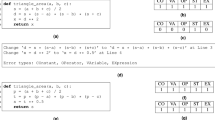Abstract
Due to the growing demand for information technology skills, programming education has received increasing attention. Predicting students’ programming performance helps teachers realize their teaching effect and students’ learning status in time to provide support for students. However, few of the existing researches have taken the code that students wrote into consideration. In fact, code is informative and contains lots of attributes. Student programming performance can be better understood and predicted by adding code information into student profiles. This paper proposed a student profiles model to describe students’ characteristics, which contains the code information and then was used as the input of a deep neural network to predict the programming performance. By comparing different machine learning techniques and different combinations of dimensions of student profiles, the experimental results show that a four-layer deep neural network fed with all available dimensions of student profiles has achieved the best prediction with RMSE 12.68.






Similar content being viewed by others
Data availability
The data that support this study are not openly available due to students’ privacy and are available from the corresponding author upon reasonable request.
References
Adnan, M., Habib, A., Ashraf, J., Mussadiq, S., Ali Raza, A., Abid, M., Bashir, M., & Ullah Khan, S. (2021). Predicting at-risk students at different percentages of course length for early intervention using machine learning models. IEEE Access, 7519–7539.
Al-Shehri H., Al-Qarni, A., Al-Saati L., Batoaq, A., Badukhen, H., Alrashed, S., Alhiyafi, J., & Olusanya Olatunji, S. (2017). Student performance prediction using Support Vector Machine and K-Nearest Neighbor. CCECE, 1–4.
Al-Sudani, S., & Palaniappan, R. (2019). Predicting students’ final degree classification using an extended profile. Education and Information Technologies, 24(4), 2357–2369.
Bennedsen, J., & Caspersen, M. E. (2019). Failure rates in introductory programming: 12 years later. ACM Inroads, 10(2), 30–36.
Bunkar, K., Umesh Kumar, S., Bhupendra, K.P., & Bunkar, R. (2012). Data mining: Prediction for performance improvement of graduate students using classification. WOCN, 1–5.
CoreNLP, (2021). Retrieved from https://stanfordnlp.github.io/CoreNLP/. Accessed 1 Oct 2021.
Cppcheck, (2021). Retrieved from http://cppcheck.net/. Accessed 1 Sept 2021.
Gil, P. D., da Cruz, S., Martins, S. M., & Costa, J. M. (2021). A data-driven approach to predict first-year students’ academic success in higher education institutions. Education and Information Technologies, 26(2), 2165–2190.
Gonzalez-Nucamendi, A., Noguez, J., Neri, L., Robledo-Rella, V., Garcia-Castelan, R. M. G., & Escobar-Castillejos, D. (2021). The prediction of academic performance using engineering student’s profiles. Computers & Electrical Engineering, 93, 107288.
Kuo, J. Y., Chung, H.-T., Wang, P.-F., & Lei, B. (2021). Building Student Course Performance Prediction Model Based on Deep Learning. Journal of Information Science and Engineering, 37(1), 243–257.
Kuzilek, J., Zdráhal, Z., & Fuglik, V. (2021). Student success prediction using student exam behaviour. Future Generation Computer Systems, 125, 661–671.
Li, S., Liu, T. (2021). Performance Prediction for Higher Education Students Using Deep Learning. Complex, 2021: 9958203:1–9958203:10.
Li, R., Singh, J. T., & Bunk, J, (2018). Technology tools in distance education: A review of faculty adoption. In EdMedia+ innovate learning, association for the advancement of computing in education. AACE, 1982–1987.
Liu, X., Woo, G. (2020). Applying Code Quality Detection in Online Programming Judge. ICIIT , 56–60.
Lu, X., Zheng, D., Liu, L. (2017). Data Driven Analysis on the Effect of Online Judge System. iThings/GreenCom/CPSCom/SmartData, 573–577.
Mai, T. T., Bezbradica, M., & Crane, M. (2022). Learning behaviours data in programming education: Community analysis and outcome prediction with cleaned data. Future Generation Computer Systems, 127, 42–55.
Moises, R. G., del Puerto, M., Ruíz, P., & Ortin, F. (2021). Massive LMS log data analysis for the early prediction of course-agnostic student performance. Computers & Education, 163, 104108.
QDUOJ, (2021). Retrieved from https://qduoj.com/. Accessed 1 Jan 2021.
Sagar, M., Gupta, A., & Kaushal, R. (2016). Performance prediction and behavioral analysis of student programming ability. ICACCI, 1039–1045.
Saito, T., & Watanobe, Y. (2020). Learning Path Recommendation System for Programming Education Based on Neural Networks. International Journal of Distance Education Technologies, 18(1), 36–64.
SIM, (2021). Retrieved from https://dickgrune.com/Programs/similarity_tester/. Accessed 1 Dec 2021.
Toledo, R. Y., & Martínez-López, L. (2017). A recommendation approach for programming online judges supported by data preprocessing techniques. Applied Intelligence, 47(2), 277–290.
Tomasevic, N., Gvozdenovic, N., & Vranes, S. (2020). An overview and comparison of supervised data mining techniques for student exam performance prediction. Computers & Education, 143.
Wasik, S., Antczak, M., Badura, J., Laskowski, A., & Sternal, T. (2018). A Survey on Online Judge Systems and Their Applications. ACM Computing Surveys, 51(1), 3:1-3:34.
Author information
Authors and Affiliations
Corresponding author
Ethics declarations
The National key research & development program (No. 2016YFB1000802, No. 2018YFB1003902) and the National Natural Science Foundation of China (No. 61772270) supported this work.
Conflict of Interest
None.
Additional information
Publisher's note
Springer Nature remains neutral with regard to jurisdictional claims in published maps and institutional affiliations.
Rights and permissions
About this article
Cite this article
Shen, G., Yang, S., Huang, Z. et al. The prediction of programming performance using student profiles. Educ Inf Technol 28, 725–740 (2023). https://doi.org/10.1007/s10639-022-11146-w
Received:
Accepted:
Published:
Issue Date:
DOI: https://doi.org/10.1007/s10639-022-11146-w




